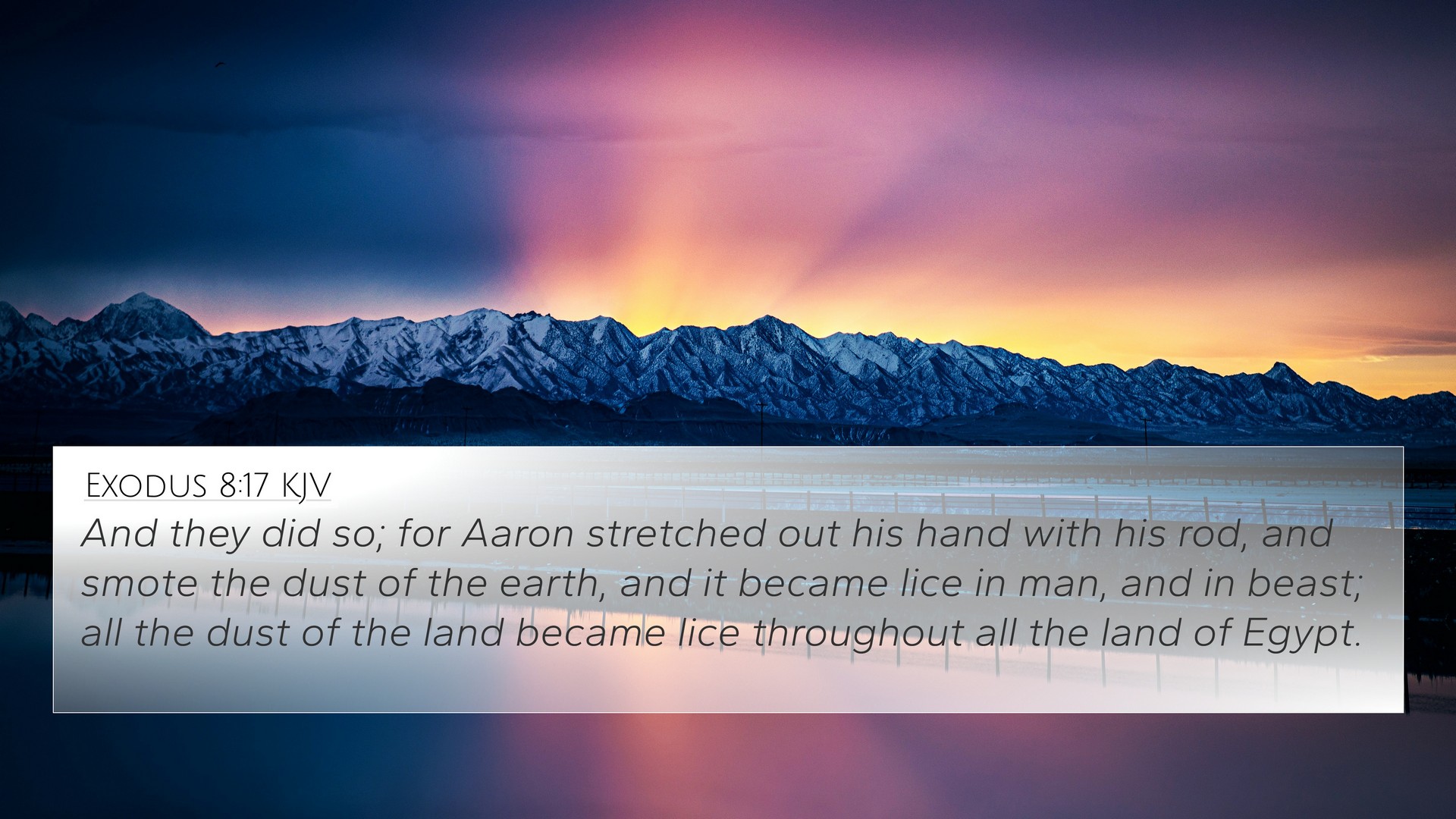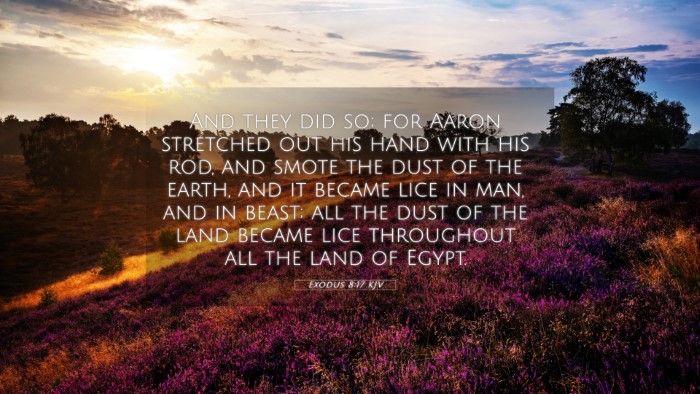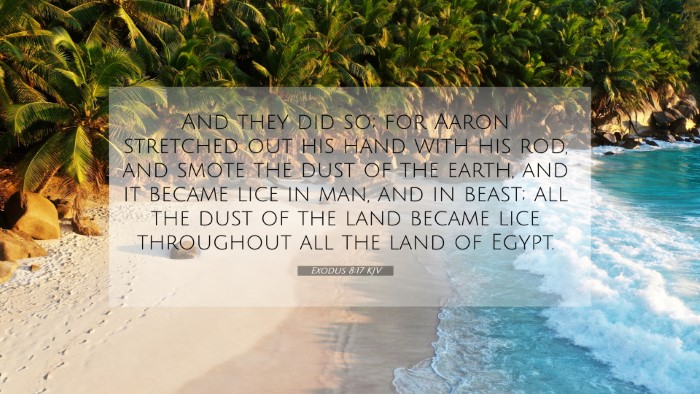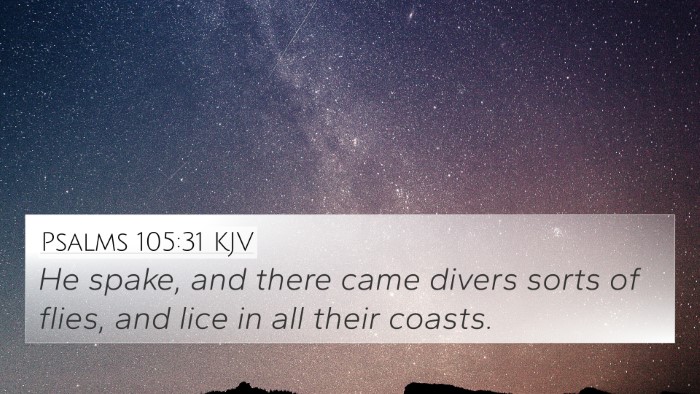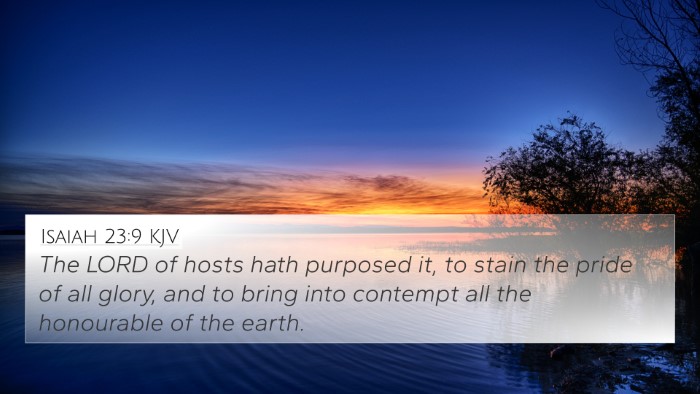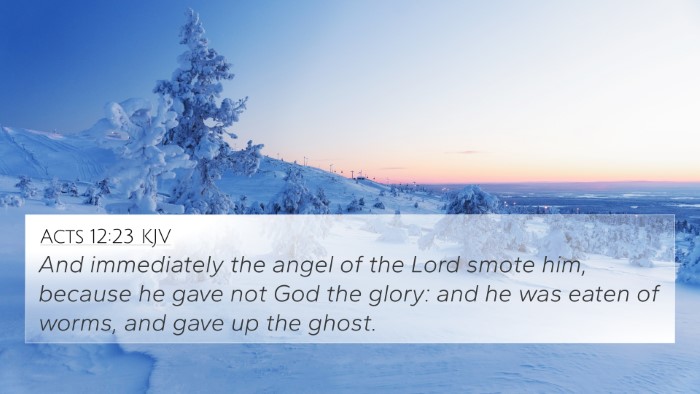Exodus 8:17 - Meaning and Interpretation
Exodus 8:17 states: "And they did so; for Aaron stretched out his hand with his rod, and smote the dust of the earth, and it became lice in man, and in beast: all the dust of the land became lice throughout all the land of Egypt." This verse is a pivotal moment in the narrative of the plagues of Egypt and demonstrates God's power against the Egyptian gods.
Context of the Verse
The context of Exodus 8:17 is during the second plague God brings upon Egypt—lice or gnats. This event underscores the increasing severity of the plagues intended to compel Pharaoh to release the Israelites from slavery. The miraculous turning of dust into lice signifies God’s direct intervention and challenge to the Egyptian magicians and their deities.
Commentary Insights
-
Matthew Henry's Commentary: Henry points out that the plagues were meant to demonstrate not only God’s power but also the futility of relying on false gods. The magicians could recreate some miracles but were ultimately helpless against this plague, proving God's supremacy.
-
Albert Barnes' Notes: Barnes emphasizes the symbolic nature of dust, representing the mortality and frailty of humanity. The transformation of dust into lice indicates that even the most insignificant elements of creation are under God’s authority.
-
Adam Clarke's Commentary: Clarke notes that lice were a symbol of filth and disease, demonstrating the degrading state into which Pharaoh had led his people through his refusal to obey God. This plague served as a physical reminder of the consequences of rebellion against God’s commands.
Biblical Cross-References
To deepen the understanding of Exodus 8:17, we can explore related Bible verses that provide thematic connections and comparative insights:
- Exodus 7:17: "Thus says the Lord: ‘By this you shall know that I am the Lord. Behold, I will strike the waters which are in the river with the rod that is in my hand, and they shall be turned to blood.’" This verse establishes God's power displayed through His servant Moses.
- Exodus 8:19: "Then the magicians said to Pharaoh, 'This is the finger of God.' But Pharaoh's heart grew hard, and he did not heed them, just as the Lord had said." This highlights the magicians’ acknowledgment of God’s might even as Pharaoh remained obstinate.
- Psalm 105:31: "He spoke, and there came swarms of flies, and lice in all their borders." This verse reflects on God's miraculous operations during the Exodus event, making a direct connection to the plagues.
- Isaiah 19:1: "The burden against Egypt. Behold, the Lord rides on a swift cloud, and will come into Egypt; the idols of Egypt will totter at His presence, and the heart of Egypt will melt in its midst." This foreshadows God's judgment upon Egypt and the collapse of its idolatries.
- Revelation 16:2: "So the first went and poured out his bowl upon the earth, and a foul and loathsome sore came upon the men who had the mark of the beast and those who worshiped his image." This alludes to the plagues in Exodus, showcasing how God's judgments echo through Scripture.
- Exodus 3:20: "So I will stretch out My hand and strike Egypt with all My wonders which I will do in its midst; and after that he will let you go." This foreshadows the miraculous acts God would perform as signs of His power.
- Matthew 12:28: "But if I cast out demons by the Spirit of God, surely the kingdom of God has come upon you." Similar to the lice plague, this demonstrates God's authority over unclean matters.
Thematic Connections
The plagues, including the turning of dust into lice, could be interpreted thematically in various ways:
- Judgment vs. Mercy: Each plague serves as a warning to Pharaoh and the Egyptians, inviting repentance while also showcasing God's justice.
- God’s Sovereignty: The absolute power God demonstrates over creation, defying both the natural and supernatural authorities of Egypt, is a recurring theme.
- Resistance to God's Will: Pharaoh's hardened heart represents the human tendency to resist God, which is explored throughout the biblical narrative.
Conclusion
Exodus 8:17 serves as a compelling reminder of God's power over the natural world and the futility of false idols. Through cross-referencing and thematic analysis, we can draw deeper insights into the narrative of Exodus and the overarching message of God's deliverance. For further study, employing tools for Bible cross-referencing, such as a concordance or cross-reference guide, can enrich one's understanding of these intricate biblical texts.
